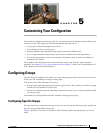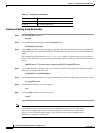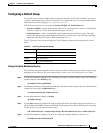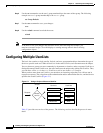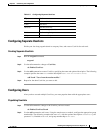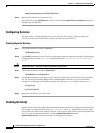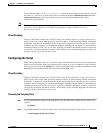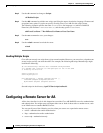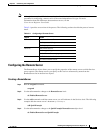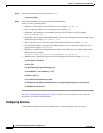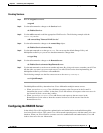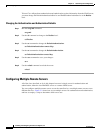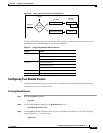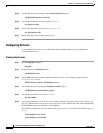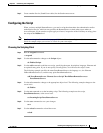
5-8
Installing and Configuring Cisco Access Registrar, 4.2
OL-17221-02
Chapter 5 Customizing Your Configuration
Configuring a Remote Server for AA
Step 3 Use the cd command to change to Scripts.
cd /Radius/Scripts
Step 4 Use the add command to add the new script, specifying the name, description, language, filename and
an optional entry point. If you do not specify an entry point, Cisco AR uses the script’s name.
The following example specifies the name ParseUserName, the language Rex (which is RADIUS
Extension), the filename
LibParseUserName.so, and the entry point ParseUserName.
add ParseUserName ""Rex libParseUserName.so ParseUserName
Step 5 Use the save command to save your changes:
save
Step 6 Use the reload command to reload the server.
reload
Handling Multiple Scripts
Cisco AR can run only one script from a given extension point. However, you can write a script that runs
several scripts serially, one after the other. For example, the following tcl script, MasterScript, might
look like the following:
## this MasterScript executes both tParseAAA and MyProcedure
# it assumes that tclscript.tcl and myscripts.tcl are in the same
# directory as this file
source tclscript.tcl
source myscripts.tcl
proc MasterScript { request response environ } {
tParseAAA $request $response $environ
MyProcedure $request $response $environ
}
Save tcl scripts in the directory /opt/CSCOar/scripts/radius/tcl.
Configuring a Remote Server for AA
All the sites described so far in this chapter have used the Cisco AR RADIUS server for authentication
and authorization. You might want to delegate either one or both of those tasks to another server, such
as an LDAP server or another RADIUS server.
You can specify one of the following services when you want to use a particular remote server:
• radius—authentication and/or authorization
• ldap—authentication and/or authorization
• tacacs-udp—authentication only.




